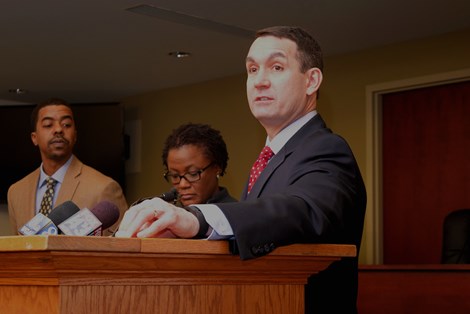Auditor General DePasquale Says City of York Slips Closer to Severe Distress; Is Latest Example of Statewide Municipal Pension Crisis

Auditor General DePasquale Says City of York Slips Closer to Severe Distress; Is Latest Example of Statewide Municipal Pension Crisis
Cash-strapped city needs $10 million by Dec. 31 to meet minimum pension payment obligations
YORK (March 23, 2015) – Auditor General Eugene DePasquale today expressed concern that the City of York’s employee pension funds are slipping closer to severely distressed levels and struggling with unfunded liabilities like nearly half the communities across the state. However, York is unique in that it continues to lag years behind on making required annual minimum employee pension payments.
Based upon the latest audit, the city owes more than $4.13 million to its employee pension funds for missed payments for 2013 and 2014. Another $5.7 million due by the end of 2015, which includes: $3.4 million for the police fund, $1.5 million for the firefighter fund, and $757,667 for the non-uniform fund.
“We are talking about the city coming up with $10 million just to meet its minimum pension obligations,” DePasquale said. “I know that despite Mayor Bracey’s best efforts, York simply does not have the money and there is no realistic way the city will ever catch up without help.”
The combined $10 million delinquent pension payments and current obligation would consume about 25 percent of the city’s entire budget.
To bring their pension obligation current, the city would virtually have to eliminate every service, program and department, DePasquale said. There would need to be cuts in the number of police and firefighters because there would barely be enough money to fund public safety.
The city is assessed accrued interest on the overdue pension debt. In the past three years, that interest amounted to $1 million in penalties.
“York is like many of the large and small communities across the state where they are struggling to meet pension obligations,” DePasquale said. “York is unique in that it continues to lag years behind in meeting its pension payments.
“That is not for a lack of effort. The city has cut expenses, cut services, laid-off employees, renegotiated a union contract with the police, and imposed the highest tax rate in York County. Yet it is not enough,” DePasquale said.
“York is the latest example of why Pennsylvania desperately needs municipal pension reform. Clearly the city cannot cut and tax its way out of this mess. The state must act and act now,” DePasquale said.
To avoid cutting 40 percent of the police force this year, the mayor and police negotiated concessions in the current collective bargaining agreement. The savings impact will be examined in the next audit.
In the latest audit, which covered Jan. 1, 2012 to Dec. 31, 2013:
• The police pension plan fell from 55 percent funded in 2011 to 52.8 percent funded in 2013.
• The firefighter’s plan fell from 60 percent funded in 2011 to 58.2 percent funded in 2013.
• The non-uniform employee pension plan slipped from 87 percent funded in 2011 to 76 percent funded in 2013.
• Overall, the combined plans are 58.5 percent funded — the same “moderately distressed” level as the City of Pittsburgh which has a population of 305,704 and an annual budget of $470 million; compared to York’s $41 million annual budget for a population of 43,781.
A plan is considered severely distressed when it is less than 50 percent funded.
Overall, York had a $64.6 million pension deficit in 2013 and is considered the eighth highest unfunded pension liability in the state. Pittsburgh has the second highest unfunded pension liability with $485 million.
“Despite a booming economy, York’s pension funds are getting worse, not better,” DePasquale said. “The city has been treading water for years as it drifts toward the bankruptcy rapids hoping someone finally comes along and throws a life-line.”
The City of York received $3.9 million in state aid toward its employee pension plans in 2012-13. Without the state aid, the pension funds fall further into distress and the municipality has to struggle to come up with money it does not have to pay the interest.
“You cannot get blood from a stone. I will not stop sounding the alarm about municipal pension reform until there is definitive action at the state level. We can’t afford to sit around and watch our cities and towns crumble under the weight of pension obligations because, in the end, we will all have to pay to clean up the mess,” DePasquale said.
The audit had two findings:
1. The City of York failed to fully pay the minimum municipal obligation (MMO). This is a repeat finding which could result in withholding state aid.
2. The city used incorrect data on a certification form resulting in a net underpayment of state aid of $23,304. The finding involved the eligibility of employees into the pension fund. The auditors discovered the reporting error and notified the city it was entitled to the underpayment.
“The good news is we found the city $23,304. The bad news is that’s a like a drop in the ocean of debt in which the city is treading water,” DePasquale said.
York is the fourth city where Auditor General DePasquale recently sounded the municipal pension alarm. The other cities are: Scranton; Pittsburgh; and Jeannette.
The auditor general’s recently released municipal pension report found that nearly half of the employee plans statewide are in distress. Overall, there is nearly an $8 billion unfunded municipal pension liability. The report predicts that without help, the City of Scranton – the state’s sixth largest city – will go bankrupt in two years.
“We need a wakeup call before Scranton goes under. Scranton won’t be alone if state leaders don’t come up with a comprehensive statewide solution soon,” DePasquale said.
The City of York Pension Trust Fund audit report is available online here.
# # #
Return to search results